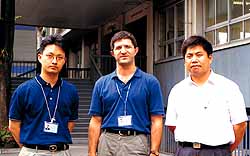|
ABU Researchers Arrive at STRL
 The
NHK Science & Technical Research Laboratories, in keeping with their
goal to be an internationally open laboratory, have established a program
to invite researchers from organizations participating in the ABU. In
this first year of the program, three researchers have been invited
from South Korea, Turkey, and China. Mr. Zungkon Yim (KBS*1, South Korea,
on the left in the picture) has been engaged in research on digital
terrestrial broadcasting mobile reception since his appointment in June.
Mr. Murat Koray Akkaya (TRT*2, Turkey, center of picture) and Mr. Kaiming
Wang (SARFT*3, China, on the right) arrived at the STRL on July 3. Mr.
Akkaya works on studies of meta-data and indexing for digital broadcasting,
and Mr. Wang is engaged in studies of next generation IP technology
for digital broadcasting services. The
NHK Science & Technical Research Laboratories, in keeping with their
goal to be an internationally open laboratory, have established a program
to invite researchers from organizations participating in the ABU. In
this first year of the program, three researchers have been invited
from South Korea, Turkey, and China. Mr. Zungkon Yim (KBS*1, South Korea,
on the left in the picture) has been engaged in research on digital
terrestrial broadcasting mobile reception since his appointment in June.
Mr. Murat Koray Akkaya (TRT*2, Turkey, center of picture) and Mr. Kaiming
Wang (SARFT*3, China, on the right) arrived at the STRL on July 3. Mr.
Akkaya works on studies of meta-data and indexing for digital broadcasting,
and Mr. Wang is engaged in studies of next generation IP technology
for digital broadcasting services.
*1: Korean Broadcasting System
*2: Turkish Radio & Television
*3: The State Administration of Radio, Film and Television
|
Yim Zungkon
(Korean Broadcasting System, Korea)
Visiting Researcher, Digital Broadcasting Networks Division
|
I am working at NHK STRL, as a visiting researcher sponsored by
NHK Research Award, a program to invite researchers to NHK STRL
from organizations participating in the ABU.
I have researched terrestrial digital broadcasting systems for 3
years in the KBS Technical Research Institute. The NHK research
project I am currently attached to is studying digital terrestrial
broadcasting, especially for mobile reception systems. Having already
completed a quarter of my research period, I have set up the computer
simulation environments of ISDB-T system with the support of NHK
STRL colleagues and participated in the many interesting field tests,
including the Tokyo Pilot Test.
Terrestrial broadcasting in Korea, as well as in Japan, has been
pinpointed as an important medium for providing people with fundamental
information. Now both Korea and Japan are at a turning point in
broadcasting history with the digitalization of terrestrial and
satellite broadcasting systems. I hope my research activity in Japan
will help to foster the digital broadcasting technology.
I think my time at NHK STRL will serve as a springboard for my future
research activity. I am deeply grateful to NHK for this good research
program. |
|
Murat Koray Akkaya
(Turkish Radio & TV, Turkey)
Visiting Researcher, Recording Technology & Mechanical Engineering
Division
|
As an invited research engineer from one of ABU countries, Turkey,
I have already completed my third month here in NHK STRL Laboratories.
As far as the time here is concerned, I am very pleased to have
come to Japan. Before arriving here, I had many questions in my
mind about the different language, culture, distance etc. But the
people in my laboratory, my friends, have helped me on every point.
Also outside work, we have had good times through many activities,
sports and gatherings, excursions, tours etc. Now I have got used
to life in Japan pretty well, even to the crowded trains.
In view of the subjects I was involved previously, I am currently
working in the Recording and Mechanical Engineering Laboratory.
In the first days, I was informed about the main projects performed
by the subgroups. These are, Home Servers, Video Hard Disk Systems,
Archive Systems, Magnetic Tape Recording, Perpendicular Recording
and Optical Recording Systems.
Now, I am involved in the Home Servers Group, working on the related
technologies and standards to realize TV Anytime systems. Focusing
on the Metadata (data about data) applications, and the standards
determining the digitalization process, I am making researches on
the digital service models carried by different platforms and NHK
STRL. Thank you. |
|
Wang Kaiming
(The State Administration of Radio, Film and
Television, China)
Visiting Researcher, Advanced Audio & Video Coding Division
|
Living in a different country means both enjoyment and misunderstanding.
Living here is quite convenient, reliable, and safe. You can walk
on the darkest street even when it is late at night. However, some
things are much different from China. In addition to the rent, for
example, I have never before experienced paying additional money
as a security before.
Founded over 70 years ago, NHK lab has provided many key techniques
to broadcasters, like satellite broadcasting, Hi-vision, flat-screen
TV sets, and the current ISDB. Technical guidance is provided to
other operators concerned, like CATV, for standardization. It is
also very active in the international standard organizations like
MPEG and ITU. Hence, much more can be learned. I'm now with the
Network Group, whose emphasis is upon IP applications for New services.
These will be helpful to the broadcasters in the future.
My colleagues are open-minded and polite. Still, I think, much more
can be done to promote internationalization. More seminars should
be held in English, and more English books should be readily available.
But, in short, I enjoy being here! |
|

